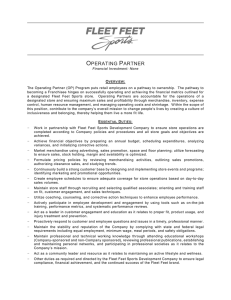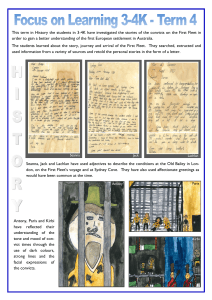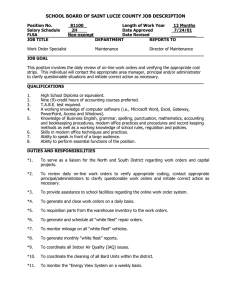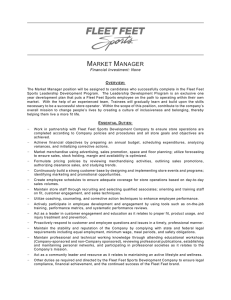BREAD AND FALCONS The View from Crete in 1501 Diana Gilliland Wright
advertisement
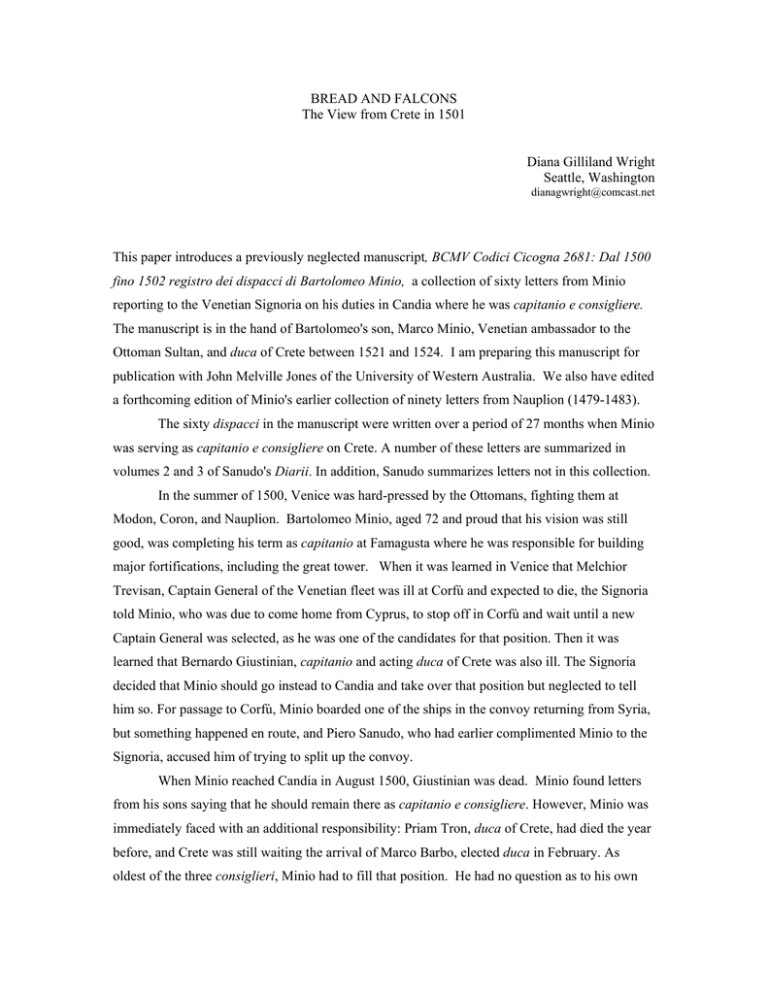
BREAD AND FALCONS The View from Crete in 1501 Diana Gilliland Wright Seattle, Washington dianagwright@comcast.net This paper introduces a previously neglected manuscript, BCMV Codici Cicogna 2681: Dal 1500 fino 1502 registro dei dispacci di Bartolomeo Minio, a collection of sixty letters from Minio reporting to the Venetian Signoria on his duties in Candia where he was capitanio e consigliere. The manuscript is in the hand of Bartolomeo's son, Marco Minio, Venetian ambassador to the Ottoman Sultan, and duca of Crete between 1521 and 1524. I am preparing this manuscript for publication with John Melville Jones of the University of Western Australia. We also have edited a forthcoming edition of Minio's earlier collection of ninety letters from Nauplion (1479-1483). The sixty dispacci in the manuscript were written over a period of 27 months when Minio was serving as capitanio e consigliere on Crete. A number of these letters are summarized in volumes 2 and 3 of Sanudo's Diarii. In addition, Sanudo summarizes letters not in this collection. In the summer of 1500, Venice was hard-pressed by the Ottomans, fighting them at Modon, Coron, and Nauplion. Bartolomeo Minio, aged 72 and proud that his vision was still good, was completing his term as capitanio at Famagusta where he was responsible for building major fortifications, including the great tower. When it was learned in Venice that Melchior Trevisan, Captain General of the Venetian fleet was ill at Corfù and expected to die, the Signoria told Minio, who was due to come home from Cyprus, to stop off in Corfù and wait until a new Captain General was selected, as he was one of the candidates for that position. Then it was learned that Bernardo Giustinian, capitanio and acting duca of Crete was also ill. The Signoria decided that Minio should go instead to Candia and take over that position but neglected to tell him so. For passage to Corfù, Minio boarded one of the ships in the convoy returning from Syria, but something happened en route, and Piero Sanudo, who had earlier complimented Minio to the Signoria, accused him of trying to split up the convoy. When Minio reached Candia in August 1500, Giustinian was dead. Minio found letters from his sons saying that he should remain there as capitanio e consigliere. However, Minio was immediately faced with an additional responsibility: Priam Tron, duca of Crete, had died the year before, and Crete was still waiting the arrival of Marco Barbo, elected duca in February. As oldest of the three consiglieri, Minio had to fill that position. He had no question as to his own 2 ability, but without a formal commissione as consigliere, he was vulnerable to serious legal charges, and the first letters show great anxiety about a letter of appointment. The sixty dispacci give an extraordinary day-to-day portrait of colonial administration, and include payrolls and ship inventories, drafts of oarsmen, collection of unpaid taxes on official salaries, and dealing with local revolts. In addition, Minio had to maintain the defense of Crete in a vacuum of information about what was transpiring in the sieges of Modon and Corone and Nauplion, and later he had to provide food from his limited stores and salaries from an empty treasury for the mercenaries protecting Nauplion, Monemvasia and Cerigo. Minio was immediately confronted with supplying the last ships going to aid Modon and Corone – which had already fallen though the news had not reached Crete – and shortly afterwards he had to repair the damaged ships limping back from the surrender, handle inventories of the goods of the deceased, and deal with the refugees. The streets of Candia were full of refugees Candia ("reduced to such misery that they would move a heart of diamond"). These letters give a a startling view of administrative and societal poverty, and there was neither funds in the treasury that could be used to feed them, nor bread to be bought. A sad off-shoot of the Modon-Corone debacle was the delivery of the body and head of Carlo Contarini, castellan at Zonchio (Old Navarino). Contarini's surrender of Zonchio without adequate resistance was offense enough, but his appearance in the Turkish camp besieging Corone, dressed in a gold robe and urging surrender, required his execution. He had been arrested by the Captain-General, tried on board the flagship, and then decapitated on the poop. All these men were of the same social class, they had known each other and their brothers and fathers, in and out of various positions, in the stato da mar and at home: this episode focused emotions and vulnerabilities. Beyond immediate issues of administration, the Cretan dispacci give intriguing glimpses of the Mediterranean world in 1500-1502. Minio, like other Venetian officials, ships' officers, and merchants, sent back to Venice any information or gossip he heard about political events and fleet movements. I give here a number of examples with the dates of the letters (m.v.). • The Ottoman fleet was sailing to Nauplion and Candia was in panic. 31/8/00 • Reports from Coron indicate that a large number of people there had treasonously chosen to surrender rather than resist. 6/9/00 • The Ottoman fleet has left Nauplion and has passed the Cape of Columns (Sounion), although an army of 5000 remains at Argos. 24/9/00 2 3 • Four French galleys, in service to the Knights of Rhodes, stopped in Candia. He has given them presents and asked them to join the Captain-General with the Venetian fleet. The Venetian fleet is following the Turkish fleet up to the Dardanelles. 24/9/00 • The Ottoman fleet has passed Negroponte and is sailing for Chios. 28/9/00 • Candia is full of refugees from Modon. 3/10/00 • The Ottoman fleet has passed Tenedos. The Venetian fleet has taken Samothrake, and has looted several Turkish ships and islands. 8/10/00 • He has received and buried the body of Carol Contarini. 29/10/00 • The new duca, Marco Barbo, has arrived. 20/11/00 • They hear from Chios that Constantinople has the plague. They also hear that 10 Turkish fuste are sailing from Sovrasti to raid in the islands. 20/11/00 • They hear there is a great shortage of grain in Cyprus which is trying to buy from Alexandria. Alexandria expects to collect tribute from Cyprus, which will have to come from Venice. 20/11/00 • They have heard that the galley Pasqualiga opened up in the sea and all are lost. 25/11/00 • The Sultan has sent a great army against the Lord of Damascus. 27/12/00 • Letters from Rhodes report that island now free of the plague. 8/1/00 • The Spanish fleet, sailing off Sicily, captured a large Cretan ship with wine to sell at Naples, and took it to Messina. 2/2/00 • The muda from Beirut arrived on the 2nd, and the muda from Alexandria on the 6th, so there are now 14 great galleys in port. 7/2/00 • Sixty Turkish fuste have arrived at Mytilene. 1/4/01 • They hear from Cyprus that the new Sultan is peaceful and a friend of our people. 1/4/01 • A spy, Tororin Vlasopoulos, from Rhodes informs them that Cem Sultan is in France. 1/4/01 (The spy is at least 5 ½ years late; Cem died in 1495) • The Grand Master of Rhodes, Pierre d'Aubusson, asked for archers and oarsmen to fight against the Ottomans and sent Crete a plenary indulgence from the Pope for those who would join them. 14/5/01 • Thirty or more Turkish ships were reported in the Cyclades. 17/5/01 • Camali, the Turkish corsair was attacking ships and coasts with a fleet of 12 galleys, sometimes cooperating with the Turkish fleet. 6/01-4/02 3 4 • Disease was running through the Venetian fleet. Crete had to import grain from Sicily to prevent starvation in the cities and to provide bread for the fleet. The villani would not volunteer for the fleet and the landowners would not send them. 3/8/01 • The Venetian fleet under Ieronimo Contarini sacked and burned Caristo on the island of Negroponte. Beyazid sent the beyler-beys of Greece and Anatolia with an army against Hungary. 15/8/01 • The King of France called on the Grand Master of the Knights of Rhodes to prepare to sail. 23/8/01 • French ships had stopped at Cania, west of Candia, and asked for bread for his ships but there wasn't enough to give them. 2/10/01 • Seven Turkish pirate fuste had captured a large Venetian ship, the Sodatilo, but when 18 barce appeared in the company of 4 French galleys, they released her and fled. 13/10/01 • The Captain-General was off Cape Malea with 30 galie sottile, galie grosse, and 8 ships of the Portuguese fleet. Minio is concerned that all these fleets will spend the winter in the eastern Mediterranean and that he will be responsible for providing bread for them. 18/10/01 • Minio has been asked to send wine and food to Mytilene as provisions in anticipation of a major Venetian-French-Knights of Rhodes attack. 31/10/01 • The French fleet, en route join the Venetian attack, stopped off Candia and sent an officer ashore to ask Minio for 40 saker falcons. Minio wrote to the district administrators across the island asking if they could find any, but it was a hard winter in Crete with the mountain passes impassable because of snow and the prospects of finding falcons were limited. (The saker, a large bird of prey of Central Europe and the steppes, winters across southern Italy and Greece, and the eastern Mediterranean.) 2/11/01 • The Portuguese fleet turned around and was sailing for Lisbon, disappointing the Venetians who had hoped for its assistance. 2/11/01 • The Turkish corsair, Henrichi, has been captured; his ship ran aground on the island of Malo, some of his men were imprisoned, and others cut to pieces. The Grand Master of the Knights of Rhodes was sailing with 32 ships to join the Venetians at Mytilene. 24/11/01 • A friar, Joanni Parpiglia, came to Candia to buy wine and staples for the Grand Master's fleet. 26/11/01 • Reports from the Captain General at Mytilene indicated that the allies were less than satisfactory and that the attack might be abandoned. 3/12/01 • The Venetian rettor at Cania suddenly lost his sight. 8/12/01 4 5 • Minio was recovering after almost a month in bed with a chest infection and extremely high fever from which he nearly died. He needed to go to Cania but didn't think he would have the strength for several days. 7/1/01 • Galleys from Dalmatia arrived and asked to buy bread, which Minio was able to supply. 7/1/01 • Friar Joanni Parpiglia asks Minio to ask the Signoria to use its influence with the Pope to make him a papal chaplain. 20/2/01 • Camali, the corsair, is reported at Negroponte with 60 ships, preparing to raid the islands for slaves. Minio has heard this from Nauplion, Monemvasia, and from Frate Juliano in Pera. 10/3/02 • Minio has still not been well enough to make an inspection trip to Cania and Suda Bay. 9/4/02 • They have not been able to buy grain from the Genoese at Chios because of the pressure Beyazid has put on them, although one ship was able to take on a load. 29/4/02 • The muda is late being able to leave Alexandria because the merchandise has not yet been collected. 29/4/02 • Frate Juliano of Pera also wants to be made a papal chaplain. 2/5/02 • Beyazid is collecting a fleet but not as large as usual, only about 150 fusti so he can move quickly. 13/8/02 • An engineer at Cania, Conte Franzon, a mercenary, has made a model of the fortifications of Cania which they are sending the Signoria. They have learned that the captain of the French ships was at Suda Bay last year, incognito, looking at the fortifications, and was extremely critical of the Signoria's lack of interest in maintaining and repairing them. 13/8/02 Meanwhile, Minio's administrative problems were constant and continuing: the harbor of Candia was too silted up to allow ships in and there were too many ships demanding servicing and repairs. The walls needed rebuilding, which involved tearing down some of the houses that had been built on them. There were rebels in Rethymon. Sitia was being harassed by pirates and the snow-filled passes prevented aid from reaching them. Half the Greek villani were refusing to share in defense against the Turks, while the other half were anxious to sign up for galley service, and almost none were willing to harvest grain, leading to a situation of near-famine across the island during those years. Minio was old and cranky and exhausted. He did not work very well in cooperation, duca Marco Barbo on his return to Venice indicated that he had some things to say privately about him. 5 6 Minio's letters end in July 1502 and presumably he returned to Venice soon after. The next year he was consigliere to the Doge and member of the Dieci. He continued working hard for Venice until his death in August or September 1518 at the age of 90. 6
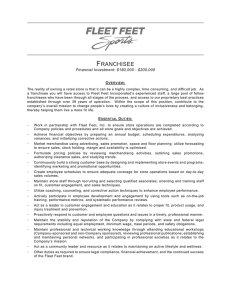
![[STORY ARCHIVES IMAGE]](http://s3.studylib.net/store/data/007416224_1-64c2a7011f134ef436c8487d1d0c1ae2-300x300.png)
